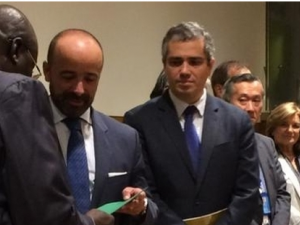New Countries Ratify the Minamata Convention on Mercury as UNEP Calls for Early Entry into Force and Effective Implementation
Discussion details
On the Eve of the UN Sustainable Development Summit 2015

New Countries Ratify the Minamata Convention on Mercury as UNEP Calls for Early Entry into Force and Effective Implementation
On the Eve of the UN Sustainable Development Summit 2015
Mr. Arrachid Ahmat Ibrahim, Deputy Director General in the Ministry of Environment of Chad deposits instruments of ratification of the Minamata Convention
UN Headquarters, New York, 24 September 2015 - The governments of Chad and Samoa announced their ratification of the Minamata Convention on Mercury, Thursday, at an event organized by the UN Environment Programme (UNEP) and hosted by the governments of Japan, Switzerland, the United States of America and Uruguay.
The event aimed at providing important momentum to accelerate the entry into force and implementation of the Convention, which will enter into force ninety days after 50 States deposit their instruments of ratification, acceptance, approval, or accession.
UNEP Deputy Executive Director Ibrahim Thiaw congratulated the governments of Samoa and Chad for being amongst the first countries to ratify the Convention, expressing his hope that enough countries would deposit their ratifications in the coming months to allow the Convention to enter into force at the soonest possible time.
Prime Minister of Samoa Tuilaepa Aiono Sailele Malielegaoi said that the environmentally sound management of waste was crucial for the development of Small Island Developing States (SIDS) yet it remained a challenge due to a complex set of factors. In his statement, he assured that Samoa had included waste management in the country's national development planning and legislation.
He also recalled that the Small Island Developing States' Accelerated Modalities of Action (Samoa Pathway) covers the management of waste and hazardous chemicals, including mercury, as a priority area.
Mr. Arrachid Ahmat Ibrahim, Deputy Director General in the Ministry of Environment, Chad, said his country would spare no effort to follow up on the implementation of the Convention with the aim to minimize the health hazards caused by mercury pollution. He urged all partners, including UNEP, to assist countries in this regards.
To date, 128 countries and the European Union have signed and 15 countries have deposited their instruments of ratification, acceptance, approval, or accession - with the United States of America the first country to do so.
Richard Erdmand, Acting US Representative to the UN Economic and Social Council, said that in the context of the UN Sustainable Development Summit, the world should not only 'leave no one behind', but should also 'leave no one exposed' to the hazards of mercury pollution.
The Minamata Convention on Mercury - named after a city in Japan where serious health damage occurred as a result of mercury pollution in the mid-20th Century - provides controls and reductions across a range of products, processes and industries where mercury is used, released or emitted. These range from medical equipment such as thermometers and energy-saving light bulbs to the mining, cement and coal-fired power sectors.
Mercury and its various compounds have a range of serious health impacts including brain and neurological damage, especially among the young. Others include kidney damage and damage to the digestive system. Victims can suffer memory loss and language impairment alongside many other well documented problems.
Log in with your EU Login account to post or comment on the platform.